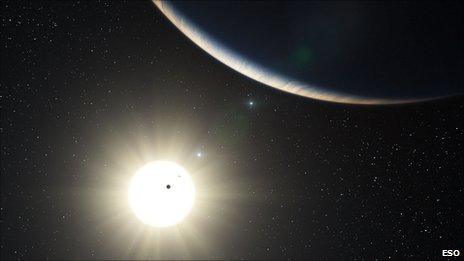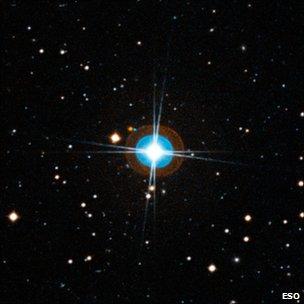Rich exoplanet system discovered
- Published

The researchers say the finding marks a new phase in the hunt for exoplanets
Astronomers have discovered a planetary system containing at least five planets that orbit a star called HD 10180, which is much like our own Sun.
The star is 127 light years away, in the southern constellation of Hydrus.
The researchers used the European Southern Observatory (Eso) to monitor light emitted from the system and identify and characterise the planets.
They say this is the "richest" system of exoplanets - planets outside our own Solar System - ever found.
Christophe Lovis from Geneva University's observatory in Switzerland was lead researcher on the study. He said that his team had probably found "the system with the most planets yet discovered".

The discovery could provide insight into the formation of our own Solar System
"This also highlights the fact that we are now entering a new era in exoplanet research - the study of complex planetary systems and not just of individual planets," he said.
The research has been submitted for publication to the journal Astronomy and Astrophysics.
Eso's High Accuracy Radial velocity Planet Searcher (or Harps) instrument was responsible for the discovery.
Harps measures the wobble of a star; this gives a measure of how much it is being tugged on by an orbiting planet.
"If there is one planet it will induce a little movement - the star will come towards us and move away," Dr Lovis explained to BBC News.
"And what works for one [planet] works for many."
With many planets orbiting the star, its movement becomes a very complex "superposition" of several different planet-induced movements.
Using Harp, Dr Lovis and his team were able to measure this and break it down, in order to calculate how many planets were in the system, how great each of their masses was, and even the path of each individual planet's orbit.
The researchers said the system around HD 10180 as unique in several respects.
It has at least five "Neptune-like planets" lying within a distance equivalent to the orbit of Mars, making it more populated than our own Solar System in its inner region. And all the planets seem to have almost circular orbits.
Dr Lovis said: "Studies of planetary motions in the new system reveal complex gravitational interactions between the planets and give us insights into the long-term evolution of the system."
False alarm?
So far, the astronomers have picked up clear signals from five planets, along with two slightly "fuzzier" signals. One of these possible sixth and seventh planets was estimated to be just 1.4 times the mass of the Earth; if its presence in the system was confirmed, it would be the lowest mass exoplanet yet discovered.
It is also predicted to be very close to its host star - just 2% of the Earth-Sun distance, so one year on this planet would last only 1.2 Earth days.
Dr Lovis said he was 99% certain that this small planet was there.
"There are five signals that are really strong that we have no doubt, but we have another two with a 'false alarm' probability of 1%," he said.
Martin Dominik, an astronomer and exoplanet hunter from the UK's University of St Andrews said the complexity and structure of this system made it an interesting discovery.
"The richness of the system of planets around HD 10180 with its many characteristic features marks the way forward towards gathering the information that will put our own existence into cosmic context," he told BBC News.
He cautioned against describing this as the "richest system" saying that it was not clear whether other systems that had already been detected hosted further planets.
Dr Dominik added: "I am tempted to consider the detected system as one of the most 'informative' ones.
"Like most discoveries in science, the findings come with more questions than answers; but in my opinion, this is what really advances a field."